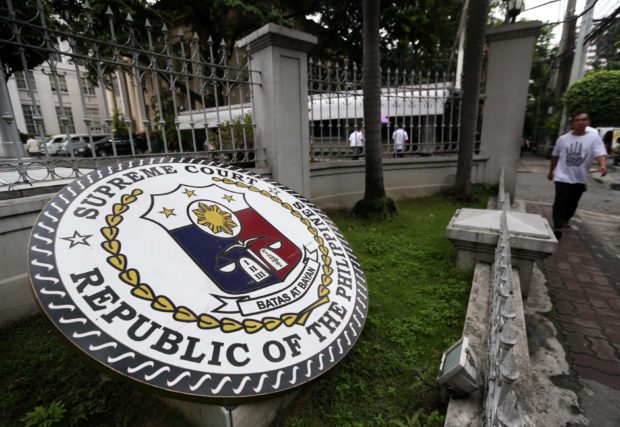
The Supreme Court symbol in Manila. (File photo LYN RILLON / Philippine Daily Inquirer)
MANILA, Philippines — Another petitioner on Thursday prodded the Supreme Court to protect the public from the “imminent terror heralded” by the Anti-Terrorism Act (ATA) of 2020 and its Implementing Rules and Regulations (IRR).
“Allowing enforcement of the ATA through the IRR can only lead to the actual and pervasive curtailment by the state of the constitutional right to free speech and expression,” read the 12-page motion filed by the Free Legal Assistance Group representing petitioner Senators Leila de Lima and Francis Pangilinan as well as journalists Maria Ceres Doyo and Maria Ressa.
Joining De Lima, Pangilinan, and Doyo in the motion are their co-petitioners in the case namely journalists Josefa Andres Maglipon Marcelo, Rachel Khan, Maria Rosario Hofelina, Lilibeth Socorro Frondoso, Maria Teresa Vitug, Mario Nery Jr., Beatrice Puente, Florangel Rosario Braid, Quezon City Rep.Christopher “Kit”Belmonte, former senators Sergio Osmena III and Wigberto Tanada Sr., former Quezon Rep. Erin Tanada III, human-rights lawyer Jose Manuel Diokno lawyer Edmundo Garcia, Lutgardo Bardo, and former Akbayan Rep. Loretta Ann Rosales.
“Only the injunctive power of the Honorable Court stands between the people and the imminent terror heralded by the ATA and its IRR. Petitioners pray the Court to wield the power,” the petitioners added.
Petitioners last August already prodded the high court to resolve the application for a restraining order after the Armed Forces of the Philippines Chief of Staff made a statement about regulating social media.
Then, a week before the release of the IRR, another motion was filed praying for the resolution of their motion to resolve the application for TRO. Still, no action was made.
In their latest motion, they said the IRR itself violated the Constitution.
“In the guise of providing for mere enforcement guidelines, the IRR extends and amplifies the constitutional violations inherent in the ATA. An unconstitutional law may not be enforced, and neither, may it be cured by equally unconstitutional rules adopted by an overeager, overstepping executive. If the stream may not rise higher than its source, so too must the fetid water remain at the bottom of the swamp,” the petitioners said.
They added that the IRR could further exacerbate the violation of constitutional rights, especially the freedoms of expression and speech.
They stressed that with the IRR, the government “dug itself deeper in its unconstitutional hole” by adding circumstances that must be considered such as the speaker, context, intent, content, and form extent of the speech or act and causation.
“Hence, the law as the government itself expressly admits through the IRR, restricts free speech on the basis of content,” they said.
Moreover, they told the SC that the IRR was drafted “ultra vires” (acting beyond one’s legal power or authority) since it was drafted and adopted in the usurpation of the legislative power reserved by the Constitution to Congress.
“It is fraught with many new substantive provisions, proviso, collatillas and conditions that are not in the ATA inserted in an obvious and hamfisted attempt to cure and insulate a law that is patently unconstitutional,” they added.
The petitioners said only the injunctive power of the SC “stands between the people and the imminent terror heralded by the ATA and its IRR.”
“Petitioners pray the Court to wield that power,” they added.
Earlier, the National Union of Peoples’ Lawyers and retired SC justice Antonio Carpio and former Ombudsman Conchita Carpio Morales as well as legal luminaries from the UP College of Law also asked the SC to resolve their respective petitions against the ATA in light of the issuance of the IRR.
There are 37 petitions pending before the SC challenging the constitutionality of the measure.
Earlier, Chief Justice Diosdado Peralta said the huge number of petitions with so many issues in each has played a part in the delay of the setting of oral arguments on the case.
He said they initially thought there would only be five petitions against the ATA. But he said, hopefully, by the third week of November, they can set a date for the oral argument.